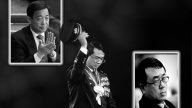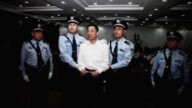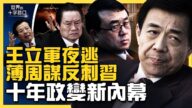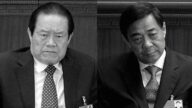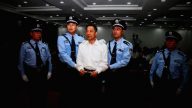【新唐人2013年07月13日訊】中共軍隊最近進行新一輪的將領調整。習近平十八大後成為軍委主席,七大軍區的高層調整至此才算完成。報導說,這次調整顯示﹕40年代出生的共軍將領退出了舞臺,七名司令都是50後。那麼,這次7大軍區司令的調整,對習近平的槍桿子領導有甚麼作用﹖讓我們來聽聽專家的分析。
中共軍隊近期進行新一輪的將領調整,成都與西藏軍區更換司令員,其中成都軍區副司令員李作成中將升任司令員﹔駐重慶的第13集團軍軍長許勇,成為西藏軍區司令員,原西藏軍區司令員楊金山 調任成都軍區副司令員。
北京時政觀察人士華頗﹕「習(近平)上任當然要對軍隊進行大換血,從軍委到七大軍區都要換上人,因為要打亂原有的軍隊人派關係,這樣才有利於他更好的掌控軍隊,因為中國現在國內的矛盾加劇,再次發生六四那樣事件的機率越來越大﹗所以習要變成一個強勢領導人,必須要有槍桿子來撐腰﹗」
有分析認為,發生在1989年的六四事件,是因為當時的中共領導人鄧小平,強勢領導軍隊鎮壓才告結束。
華頗﹕「雖然說當初六四的時候,軍隊好些也是反對開槍鎮壓的,但是有鄧小平的強勢人物…現在如果再遇到那種情況,如果習要是沒有鄧那種權威,我看後果就不堪設想了。」
有人認為,從這次中共軍隊司令員的調度可以看出,現任中共領導人習近平提拔軍隊幹部的標準,不特別顧慮派系,注重的是實戰經驗。
華頗﹕「首先李作成這個人是廣州軍區的,成都軍區捲入薄王案,所以首先李作成從廣州軍區調來,來控製成都軍區。再者,習近平這次重新啟用他,當然他要對習近平感恩載德,要表示忠心。14集團軍,就是不聽話,是薄一波的老部隊,那我就把13集團軍的軍長提拔起來。我想張海洋(原成都軍區政委)那些親信,肯定是不得勢了。」
去年重慶王立軍事件爆發後,中共前重慶市委書記薄熙來在中共兩會一結束後,即刻被免去職務,而後,爆出前中央政法委書記周永康和薄熙來預謀對習近平發動兵變。
成都軍區負責四川、貴州、雲南、重慶防務,下轄13、14兩個集團軍。其中,駐守雲南的14軍,前身為薄熙來之父薄一波創建的山西新軍。在王立軍闖入美領館事件之後一天,薄熙來高調訪問14集團軍。之前還有報導,重慶市長黃奇帆在薄熙來被拿下後,揭發出薄熙來不止一次對他談過掌握軍隊的問題。他表示:「薄熙來聲稱,現在掌握在他手裡的軍隊,至少有兩個集團軍。」
據大陸媒體報導,成都軍區當時的幾個高級將領與薄熙來關係密切,其中包括前成都軍區政委張海陽。他們可能已涉入周、薄的政變計劃中。
而這次中共七大軍區高層調整後,據了解,七名司令都是50後,除了剛調任的成都軍區李作成,和西藏軍區的許勇之外,還包括﹕廣州軍區司令員徐粉林、濟南軍區趙宗岐、瀋陽軍區王教成、北京軍區張仕波、蘭州軍區劉粵軍、和南京軍區的蔡英挺。
華頗﹕「中共歷代領導人,都對軍隊進行一種封閉式的管理、洗腦式的教育,強調黨對軍隊的絕對領導,但是社會上的這些思潮、多元化的思想,對軍隊的衝擊到甚麼時候﹖甚麼程度﹖都是個未知數﹗就像當初蘇聯等中歐諸國那些政權的倒臺,都是軍隊在關鍵時刻的倒戈﹗」
習近平除了更換司令員之外,還對多個省軍區將領進行更換,如﹕新疆生產建設兵團軍事部部長高龍福,調任陝西省軍區司令員﹔南京軍區副參謀長何衛東,調任江蘇省軍區司令員﹔福建省軍區參謀長熊安東,升任江西省軍區司令員。
採訪/易如 編輯/周平 後製/李勇
Xi Jinping Reshuffles Officers in the Seven Major Military Regions
Recently, China has implemented a new round of
adjustment of People’s Liberation Army (PLA) generals.
After the Chinese Communist Party’s (CCP) 18th congress,
new leader Xi Jinping became the head of the military.
The seven major military regions have since
completed its appointment of high-level generals.
Sources say that commanders born after 1940
were all replaced during the re-shuffling.
The seven new commanders were born after 1950.
How does Xi Jinping benefit by making this move?
Let take a look.
This move included swapping commanders
between Chengdu and Tibet military regions.
Li Zuocheng, deputy commander of the Chengdu
military region, was promoted.
Meanwhile, Xu Yong, commander of the PLA 13th Army,
took over the Tibetan military region.
Yang Jinshan, former commander of the Tibet
military region, became Chengdu deputy commander.
Hua Po, Beijing current affairs observer: “Xi Jinping
certainly needs to reshuffle military personnel.
The Central Military Commission made changes
to the seven military regions.
The purpose is to disperse the army factional relationships,
because this way Xi can control his army well.
Because China’s domestic disputes have worsened, incidents
like Tiananmen Sq. Protest on June 4, 1989 can take place.
Thus, Xi needs to become a strong leader,
and needs military’s support.”
Analysts believe that military, lead by former Chairman Deng
Xiaoping, brutally suppressed the “June 4” protest in 1989.
Hua Po: “Although at the beginning, the military was against
the idea of shooting protesters, Deng Xiaoping tightly controlled the army.
If similar things happen again, but Xi isn’t as strong as Deng,
it will be a disaster.”
Some said that the military personnel re-adjustment shows
Xi Jinping’s principle of promoting military officers.
Xi wasn’t worried about which factions they belong to,
but was focused on their practical fighting abilities.
Hua Po: “Li Zuocheng was
in the Guangzhou military region.
As the Guangzhou military got involved
in the Bo Xilai and Wang Lijun cases,
Li was transferred from Guangzhou to Chengdu first,
preparing to take over Chengdu.
In addition, Xi Jinping promoted Li Zuocheng this time,
Li will certainly show his appreciation and loyalty.
The 14th Army isn’t as loyal to Xi as it was to Bo Yibo,
father of Bo Xilai.
Thus Xi focused on the 13th Army,
and promoted their commander.
I think former PLA secretary in the Chengdu military region,
Zhang Haiyang, and his allies, have lost their favor.”
Since the Wang Lijun incident in Chengdu last year, Bo Xilai
was immediate removed after the CCP’s two annual meetings.
And then, news broke out that Zhou Yongkang and Bo Xilai
had conspired to overthrow Xi Jinping.
Chengdu military region is responsible for the defense
of Sichuan, Guizhou, Yunnan and Chongqing.
The 13th and 14th Army are under the control
of Chengdu military region.
The 14th Army stationed in Yunnan Province, formerly known
as Shanxi New Army, was established by Bo Xilai’s father.
A day after Wang Lijun fled to the US Consulate in Chengdu,
Bo made a high-profile visit to the 14th Army.
Sources said that after Bo Xilai was sacked,
Chongqing major Huang Qifan exposed the fact that
Bo has told him several times that he had the control
of the army in his hands.
Huang said, “Bo claimed that he controlled at least
two armies.”
Media in Mainland China reported that at that time,
Chengdu military’s senior officers had close ties with Bo,
including Zhang Haiyang, the former PLA secretary
in Chengdu.
They likely were involved in Zhou Yongkang
and Bo Xilai’s coupe plan.
Sources said that seven of the PLA military regions’
new commanders are all born after 1950.
Aside from Li Zuocheng and Xu Yong,
this also includes Guangzhou military chief Xu Fenlin,
Jinan commander Zhao Zongqi, Shenyang commander
Wang Jiaocheng, Beijing commander Zhang Shibo,
Lanzhou commander Liu Yuejun
and Nanjing commander Cai Yingting.
Hua Po: “The CCP successive leaders conducted
a closed management and brain-washed the army.
They stressed the Party’s absolute power over the army.
However, it is still unclear how much of the public’s free
thoughts can influence soldiers, military officers and the army.
It could be like the collapsed regimes in Eastern Europe
and Russia –in the end, the military changed its stance and went against the regimes.”
Xi Jinping has not only appointed new commanders,
but has also replaced several military regions’ officers.
For example, Gao Longfu, director of Xinjiang Production
and Construction Army, was appointed Sha’anxi military commander.
He Weidong, Nanjing military deputy chief of staff
was transferred to be Jiangsu military commander.
Xiong Andong, Fujian military chief of staff
was promoted to be Jiangxi military commander.


